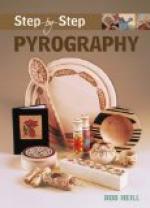“Naturally enough, when wisdom must ever contend against the whelming force of folly. But there is something worse—the will of a ruler seeking to enslave knowledge to his own purpose. A madman with ideals is bad enough, but Barbarossa’s son is a diabolically sane person without any. A man is not called ‘the Cruel’ without reason.”
“But what object—” Alan began, and paused.
“Archiater the physician, as I knew him, would have been rather worse than useless to that prince as I have heard of him,” answered the Paduan deliberately. “Such a patron demands creatures who do as they are told,— which is not the duty of a philosopher. The easiest way to dispose of a man who knows too much is to dub him a wizard. But, of course, all this is merely guessing in the dark.
“The little that I do know is this. When we had been acquainted for about three years he told me that he had been offered the use of a house in Goslar in which he might carry on his experiments privately. The chief inducement, for him, lay in the nature of the country, which is very rich in minerals, and he decided to leave Padua in the hope of making important discoveries in this new field. He went first to Hildesheim and developed a formula for making bronze which is said to be extraordinary, and then began exploring the Harz mountains. He sent me some of the ores he found; it appears that there is nearly everything in those ranges. I heard no more until the news came, in a roundabout way, that he was dead and his ashes cast to the four winds. His writings were supposed to have been burned at the same time, but not all of them were, for three manuscripts at least must have gone to make up the fragments we found among our bezants. I wish for your sake, Alan, my son, that I could tell you more, for I know of no man who would gain more by Archiater’s work than you. If he had been your master I think you might have rivaled the Venetians.”
Alan was not vain, and he never dreamed that Tomaso thought so highly of his ability. In the Middle Ages the secrets of such arts as glass-making, enameling, leather work, gold and silver work, and the making of dyestuffs, were most jealously guarded. Alan had had two fortunate accidents in his life; he had been taught in the beginning by a master-artist, and later had come upon writings by a still greater genius, the Byzantine philosopher of whom Tomaso had been speaking.
From the first glimpse he had had of the crabbed, clear handwriting, the terse phrases, the daring and independent thought of Archiater, he had been fascinated. Now he had set out to cross the narrow seas and find out what, if anything, remained of the master’s life-work.
“May there not have been some friend or pupil,” he asked wistfully, “who would have rescued his manuscripts?”
“In that case,” Tomaso replied with gentle finality, “I think some of us must have heard of it.”
“And yet,” Alan persisted, “some one had those parchments—some one who may have received them from Archiater himself.”




